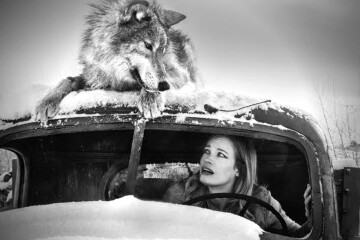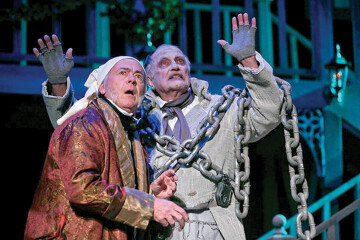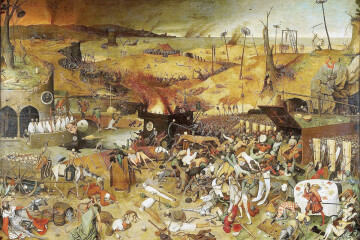Intermountain Opera: Kiss Me Kate
Anyone who grew up in the 1960s-70s likely remembers the famous stormy relationship of Liz Taylor and Richard Burton. These internationally famous Hollywood stars argued and fought with each other in public and private, yet loved each other dearly. In 1967, Taylor and Burton starred in a blockbuster Hollywood movie of Shakespeare’s The Taming of the Shrew. But only 20 years earlier Shakespeare’s Taming of the Shrew anticipated their future relationship in a clear case of life imitating art when the musical Kiss Me Kate was written and produced by Bella Spewack, Samuel Spewack, and Cole Porter.
Kiss Me Kate opened on Broadway in 1948 and had 1,077 runs after it first opened, followed by 400 performances in London and a two-year run in Australia. Revivals of the very popular Kiss Me, Kate have run almost continuously from then through the 2019 Broadway revival.
On February 6, Intermountain Opera presents its 2020 version of Kiss Me Kate at The Ellen Theatre, downtown Bozeman. Intermountain Opera is pleased to bring another musical to the Bozeman stage. Executive Director Jackie Vick speaks to the trend among opera companies of bringing musicals to the opera stage. “Musicals can be easier for people to access and understand, and thus, it’s an easy way to understand opera.”
Inspired by the on-stage/off-stage battling of husband-and-wife actors Alfred Lunt and Lynn Fontanne during their 1935 production of The Taming of the Shrew, Bella and Samuel Spewack wrote the story for Kiss Me Kate, and Cole Porter, already a famous musician, wrote the music and lyrics. Kiss Me Kate is the story of an acting company putting on a production of Shakespeare’s The Taming of the Shrew. The conflict on and off-stage between Fred Graham, the show-inside-the-show’s director, producer, and star, and his leading lady, his ex-wife Lilli Vanessi, echoes the drama of Shrew.
In Intermountain Opera’s production of Kiss Me Kate, Kristin Hammargren plays Lilli Vanessi and Kate; Kristin has toured with Montana Shakespeare in the Parks and also appeared in the Montana Shakespeare in the Parks/Intermountain Opera co-production of A Little Night Music. Marc Womack returns from last year’s Intermountain Opera’s production of Eugene Onegin as the Kiss Me Kate characters Fred Graham and Petruchio. John Riesek, also a veteran of last year’s production of Eugene Onegin, returns to play Bill Calhoun and Lucentio. The characters of Lois Lane and Bianca are played by Katrina Thurman, making her first appearance onstage in Bozeman. Fifteen local performers fill out the cast.
The Taming of the Shrew, William Shakespeare’s play written around 1592, is the story that Kiss Me Kate is based on. Shrew tells the story of the courtship between Petruchio and Katherina, a strong-willed woman. A subplot in the story is about the suitors who are courting Katherina’s sister Bianca. While Shakespeare wrote this play as a comedy, some scholars feel Shakespeare was trying to make a point about the way women were treated like property during his time, a time when using physical force against one’s wife was considered normal. Shakespeare’s play seems to question the use of physical force and highlight his society’s hypocrisy, but still acknowledges that strong-willed women might need to be “tamed.”
Society has often dismissed strong-willed or opinionated women as shrill, hysterical, and stubborn, all negative aspects, while at the same time praising men for those same traits. Both Kiss Me Kate and Taming of the Shrew feature women who are labeled shrews, but the shows develop the women further, giving viewers the opportunity to see these strong-willed women as deeper characters.
As Hammargren points out, in Kiss Me Kate, Kate’s character is developed in such a way that one can see how vulnerable she feels at times, and indeed, when she sings “So In Love,” Hammargren says, “The song is a confession and a declaration. She will love him until she dies. There is a lot of vulnerability, emotion, and compassion underneath the surface.” Likewise, in another of Cole Porter’s famous songs he wrote for this musical, “Wunderbar,” both Fred Graham and Lilli Vanessi sing about their love for each other in soft revealing tender lyrics as they remember how much they loved each other in the past.
Porter, the son of a farmer from Indiana, was sent to Yale to become a lawyer so he could protect the family farm’s business. He soon migrated to music, where he quickly became skilled at writing clever and catchy little tunes that became popular. By the time the Spewacks wrote Kiss Me Kate, Porter was a well-established comopser and song writer, known for such hits as “Begin the Beguine,” “It’s De-Lovely,” “I’ve Got You under My Skin,” “In the Still of the Night,” “Night and Day,” “I Get a Kick Out of You,” and over 800 more songs.
For Kiss Me Kate, Porter wrote the songs that made it so popular and long-lasting, including “Wunderbar,” “Always True To You In My Fashion,” “Why Can’t You Behave,” “Too Darned Hot,” “Brush Up Your Shakespeare,” and thirteen others. Many people consider his greatest success was Kiss Me Kate, for which he received two Tony Awards—Best Composer and Lyricist and the first ever Tony for Best Musical.
Sharon Beehler, Emeritus Professor at MSU, talks about how casting women as shrews has been with us forever, but what Shakespeare did with his play Taming of the Shrew that was unique was giving Kate, the main character, a dimension, some background, and a voice, for one of the first times in history. Beehler points out that this continues with Kiss Me Kate, despite the thread of misogyny that runs through both plays.
On October 16, 2017, the #MeToo hashtag was created, and the MeToo movement began, allowing millions of women around the world to register their frustration with a system that allowed men to harass women and get by with no consequences. To many people, 2020 seems like it should be far removed from the time when women were treated like property. Against the backdrop of the MeToo movement, it’s hard to understand how plays such as William Shakespeare’s Taming of the Shrew, or the popular musical Kiss Me, Kate, can be popular. It bothers us to see and read news indicating people still find this not only acceptable, but even humorous.
The question that often comes up when people contemplate these shows is: how can this be okay, especially now in 2020? Many attempts have been made to analyze and offer answers; today most people read Taming of the Shrew and Kiss Me Kate ironically. For the very popular and successful 2019 Broadway revival of Kiss Me Kate at the Roundabout Theatre in New York, composer-lyricist Amanda Green says, “The prism that we look at relationships between men and women is different [today] than the time it was written. I’m not re-inventing the wheel with Kiss Me, Kate, but we felt that it was our responsibility to see if there were changes we could make. You can’t erase it or pretend that 1949 is 2019, but there are things that you can adjust to make her more of an equal.”
Some plays have attached feminist endings, adapting Shakespeare’s Shrew with small but surprisingly effective endings. In a brief scene that Montana Shakespeare in the Parks performed a year ago, Executive Artistic Director Kevin Asselin had the actress playing Kate slap her husband in his face in the final scene. Come and see for yourself how Intermountain Opera will stage the gender dynamics.
Beehler is giving a “Preludes and Prologues” lecture at the public library about Intermountain Opera’s production of Kiss Me Kate on February 2nd from 2-4 pm. This event is free and open to the public. Beehler will talk about the background and history of both Taming of the Shrew and Kiss Me Kate for the first half of the program, and the lead actors and director of Kiss Me Kate will give brief glimpses of the play, singing and re-enacting scenes.
Kiss Me Kate remains a very popular musical, filled with lovely songs and a fascinating story line. It is one of the few successful musicals that have been made from one of Shakespeare’s plays. Audiences always love the play, and revivals continue to be sold out everywhere.
There are six performances of Kiss Me Kate, all at The Ellen Theatre. Shows are on February 7th, 8th, 14th, and 15th at 7:30 pm, and Sunday matinees on the 9th and 16th at 3 pm. For tickets or more information, please visit the Intermountain Opera website at www.intermountainopera.org







